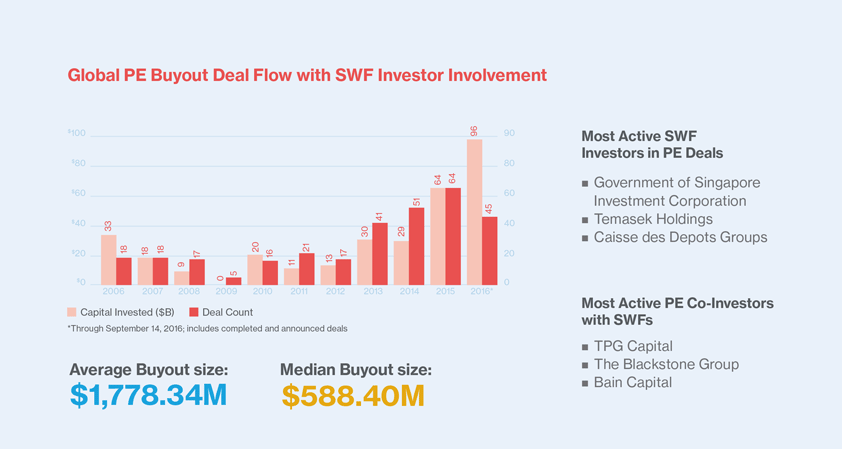Sovereign Wealth Funds Spell Opportunity for Private Equity
PE firms with a clear understanding of how to build relationships with them are winning the business.

With considerable assets at their disposal, sovereign wealth funds are fast becoming a growing source of capital for private equity— good news for middle-market PE funds. These state-owned investment vehicles, focused on returns to boost the economies of their home countries, tend to be long-term institutional investors with diverse investment portfolios.
But their diversity presents hurdles for private equity firms looking to woo investment. Fund priorities vary, whether for pension obligations, savings, government policy initiatives or social welfare. In addition, the size, investment capacity and transparency of SWFs are as wide ranging as the cultures creating them.
Compare, for instance, the State Administration of Foreign Exchange of the People’s Republic of China—worth $474 billion— which was set up to help manage China’s foreign exchange reserves, with the Alaska Permanent Fund Corporation, a $54-billion fund that can spend its profits on any public purpose in the state.
According to the Sovereign Wealth Fund Institute, some $454.6 billion was allocated to private equity from sovereign wealth funds in the 12 months ended June 2016, up from $432 billion in the same period a year earlier. The top five private equity funders were Investment Corporation of Dubai, Temasek Holdings (Singapore), Mubadala Development Company (UAE–Abu Dhabi), China Corporation and the Qatar Investment Authority, according to SWFI data.
One thing is clear: as SWFs chase higher-yield investments, private equity is getting a boost. And PE firms with a clear understanding of how to build relationships with them are winning the business.
“Knowing a prospective (SWF’s) investment objectives, strategy and style preferences all help to avoid wasted efforts and resources,” says Patrick J. Schena, co-head of the Fletcher Network for Sovereign Wealth and Global Capital at Tufts University’s Fletcher School of Law and Diplomacy.

TAILORING THE APPROACH
When private equity is ready to connect, a third party is one of the best ways to get an introduction, as well as to narrow information gaps, Schena says. Cross-border investment can be complicated, so an experienced investment banker, global law firm or placement agent can help facilitate a deal.
“Because most sovereign wealth funds are non-U.S., the logistics of introductions, traveling and relationship-building will likely contribute to challenges and greater investment in time and resources,” Schena says, adding that it’s important to build relationships with senior investment staff at the SWF.
SWFs are particularly interested in co-investment opportunities that allow them to “sidestep the hefty fees that come with traditional GP/LP partnership structures,” says Nizar Tarhuni, a senior analyst at PitchBook, the research firm that tracks private capital. “They can really participate in a larger chunk of the investment’s upside by holding equity in the direct asset being acquired.”
Understanding the SWF’s future liabilities is also important, Tarhuni says. For instance, if a fund hails from a fairly resource-dependent country, that fund may need to hedge against potential downturns in commodity prices through a predefined minimum level of return, he says.
“You have to be able to explain your strategy and explain it well, and it always helps to have contacts.”
Michael Maduell
President of Sovereign Wealth Fund Institute
THE EARLY BIRD GETS THE WORM
Private equity managers need to begin the investor relations process early, Tarhuni says, identifying if the SWF can benefit from the PE fund’s strategy and if the PE fund can adequately manage the outsized commitments SWFs typically deploy. Meanwhile, SWFs based outside of the United States often look to develop relationships with a private equity firm’s general partners before the PE fund actually comes to market.
“Reaching out to them before a fundraising is officially launched is often the best way to proceed,” says Kelly DePonte, managing director for Probitas Partners, an independent global placement advisory firm. Stressing the wide diversity of SWFs, he says funds should tailor their pitches specifically to the SWF and avoid standard templates.
“Most sophisticated sovereign wealth funds have strong capabilities in-house, and if you have a compelling story and good return numbers, they’ll be interested in middle-market groups.”
Josh Lerner
Harvard Business School
Once a private equity firm is in the door, it’s up to its fund manager to make a good case, says Josh Lerner, Jacob H. Schiff professor of investment banking and head of the entrepreneurial management unit at Harvard Business School.
“Most sophisticated sovereign wealth funds have strong capabilities in house, and if you have a compelling story and good return numbers, they’ll be interested in middle-market groups,” Lerner says.
ADDITIONAL CONSIDERATIONS
While compliance and risk management are concerns for any deal, the political climate and social concerns in an SWF’s home country also come into play.
There are no hard and fast rules for managing reputational risk. While well-documented human rights violations might be impossible to ignore, other ethical considerations could be more subjective, DePonte says. A fund manager needs to consider the potential for negative publicity and how it might impact other large investors in their fund.
Regulatory and legal considerations vary by region. In the United States, PE funds are subject to the Federal Corrupt Practices Act, in addition to a host of other antitrust, banking and securities laws. Investment in U.S.-based entities by SWFs requires review by the Committee on Foreign Investment in the United States, or CFIUS. But according to DePonte, CFIUS focuses its efforts on foreign entities that buy controlling interests in U.S. companies.
THROUGH THE SWF LENS
On the flip side, SWFs have their own legal and regulatory considerations, says Harvard’s Lerner. Investment bankers and other professionals familiar with a specific country can help navigate the challenges a cross-border deal might present.
Time frames to close vary considerably by country. Working with SWFs in Asia and the Persian Gulf, for instance, can take more time than deals in Europe, says Michael Maduell, president of the Sovereign Wealth Fund Institute.
“You have to be able to explain your strategy and explain it well, and it always helps to have contacts,” Maduell says.
Myra Thomas is a business writer based in northern New Jersey.


